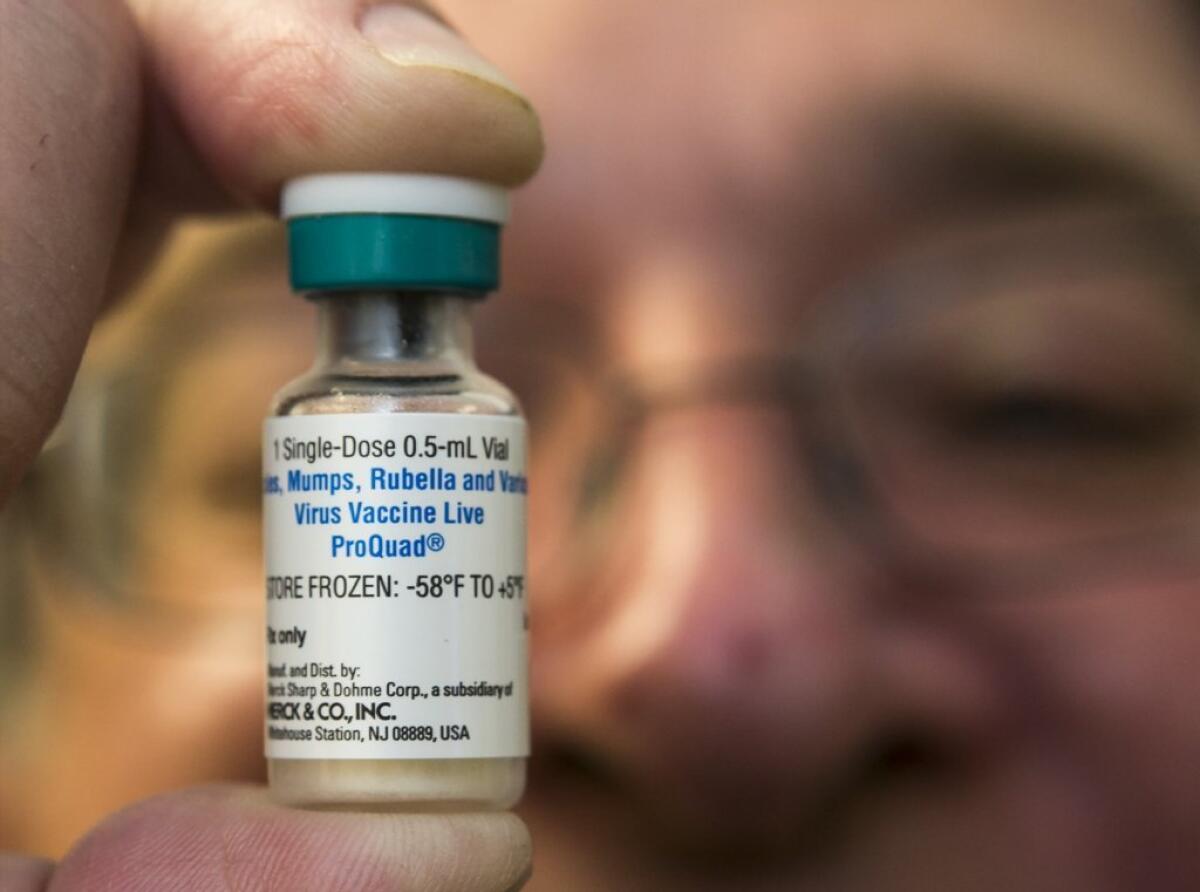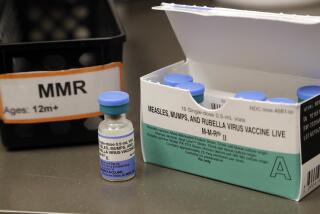Old-school and current vaccines have no link to autism (again), study says

The MMR vaccine, when administered to macaque monkeys on a schedule typical in the 1990s, did not result in autism-like changes in the brain or in the animals’ behavior, a new study finds.
Multiple vaccines containing the preservative thimerosal, administered to macaque monkeys on the schedule that pediatricians followed in the 1990s, resulted in none of the key brain or behavioral changes linked to autism, a new study shows.
The same study also administered a wide range of vaccines including the measles, mumps and rubella (MMR) vaccine--which never contained thimerosal--to rhesus macaques. Again, it found no evidence of changes in brains or behavior that would implicate either the much-maligned MMR vaccine or a combination of many vaccines as a cause of or contributor to autism.
Just two weeks after candidates for the Republican presidential nomination reprised the allegation that childhood vaccines may be responsible for the dramatic rise in the number of children with autism, the new research offers additional evidence against such a link.
A neurodevelopmental disorder now affecting roughly one in 70 children in the United States, the autism rate has been on the rise for several decades, confounding experts.
Some of that increase is thought to stem from broader and earlier recognition of its behavioral abnormalities--including repetitive behaviors and difficulties in communication and social development. But researchers are increasingly focusing on a baby’s intra-uterine environment as the time and place in which the seeds of autism may be planted.
The latest research, published Monday in the journal PNAS, casts further doubt on a suspected link between autism and vaccines, which has fueled widespread resistance to vaccinations currently recommended for American children. So far in 2015, 189 people in the United States have contracted measles in a series of outbreaks that the Centers for Disease Control and Prevention has linked to low vaccination rates in communities scattered across the country.
Suspicion that a link between autism and vaccines (particularly those containing the preservative thimerosal) persists despite a notable absence of proof. Since 2003, nine studies conducted or funded by the CDC have found no link between vaccines containing thimerosal and autism spectrum disorder, nor any link between the MMR vaccine and the neurodevelopmental disorder.
The research of Andrew Wakefield, the British physician who purported to establish such a link in 1998, was found to have been fraudulent and in 2010 Wakefield was stripped of his white coat in Britain.
In 2011, the Institute of Medicine--a group of independent experts meeting under the umbrella of the National Academies of Science--declared that, with rare exceptions, eight vaccines widely administered to children and adults are safe, and found no evidence for a vaccine-autism link.
The use of the mercury-containing preservative thimerosal in childhood vaccines was, however, largely phased out in 2001. It is still used in some influenza and meningitis vaccines and can be found in trace amounts in one formulation of the vaccine against diptheria, tetanus and pertussis.
In the current study, 79 male infant rhesus macaques--primates whose physiology and brain development closely parallel those of human babies--stood in for humans from birth to roughly 18 months of age.
While one group of macaques got saline (or placebo) injections, 12 others were administered a battery of vaccines following the course and timing recommended for American children in the early 1990s--a time when U.S. children had the highest exposure, in vaccines, to thimerosal.
Another dozen macaques got the vaccine regimen recommended in 2008. That schedule had the greatest number of different vaccines, and it closely resembles the recommended vaccination schedule in place today.
With other groups of macaques, the researchers accelerated the schedule of childhood vaccination to account for macaque babies’ speedier development. And they tested the effects of vaccination regimens in which only thimerosal-containing vaccines were active, or only the measles, mumps and rubella vaccine was active.
Researchers zeroed in on the macaques’ behavior between the ages of 12 months and 18 months. At a year old, a little macaque reaches a developmental stage typical of a 4-year-old human child. That’s an age at which autism symptoms are typically very pronounced.
All of the macaques studied developed a normal range of behaviors after vaccination and six months of social living, the researchers found. And virtually none exhibited autism-like behaviors such as rocking, self-clasping and repetitive actions.
Neither did the brains of vaccinated macaques exhibit some key hallmarks of autism, researchers found. The post-mortem brains of children with autism who have died have typically shown distinct differences from the brains of normally developing children: in three regions of the brain--the cerebellum, the hippocampus and the amygdala--the brains of children with autism depart significantly from the norm in size and in the density and structure of cells.
The researchers found none of these differences when they compared the post-mortem brains of 20 macaques who got either the highest dose of thimerosal or the most extensive range of vaccines with those of 12 who got the placebo injections.
“This study is one more piece of evidence that shows that the schedule created by CDC and recommended by the American Academy of Pediatrics is a very safe schedule to protect children from specific diseases, at the specific times when they’re most vulnerable,” said Dr. Tanya Altmann, a Calabasas pediatrician and assistant clinical professor at UCLA’s Mattel Children’s Hospital.
Altmann, who is also a spokesperson for the American Academy of Pediatrics, said she is seeing “fewer and fewer families” who are resisting her recommendations for vaccinations. As they’ve seen and read of outbreaks, Altmann says families “actually want to protect their kids.”
Follow me on Twitter @LATMelissaHealy and “like” Los Angeles Times Science & Health on Facebook.







